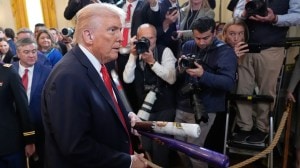China,Germany slam US money policy before G-20 summit
China kept up a drumbeat of criticism of US easy money policies.
China kept up a drumbeat of criticism of US easy money policies on Tuesday,warning two days before a G-20 world economic summit that Washington could destabilise the global economy and inflate asset bubbles. German chancellor Angela Merkel dismissed US calls for numerical limits for current account balances but said she hoped to avoid a confrontation at the Seoul summit between China and the United States over trade and currencies. I dont think much of quantified balance of payments targets, Merkel told Tuesdays Financial Times,warning that monetary tensions could fuel protectionism. US Treasury secretary Timothy Geithner has already backed away from the proposal to set targets for current accounts gaps,and Japanese finance minister Yoshihiko Noda said it was not likely that the G-20 would agree on any hard numbers. Its more likely that countries will agree a common approach,and finance ministers from the member countries will debate the details later, he told reporters in Tokyo.
The US Federal Reserves new $600 billion bond-buying programme has drawn global scorn because of concerns it will send a flood of cash into the world economy without doing much to reinvigorate a lackluster US recovery.
Ma Delun,a deputy governor of the Peoples Bank of China,said he was concerned the Feds spending spree may undermine efforts to balance out global growth. The Feds programme may add risks to the global economic imbalance,put pressure on emerging markets to adjust their international balance of payments and could also stir the formation of asset bubbles,all of which require our vigilance,Ma said in Beijing. In the latest move by an emerging economy to brake inflows of hot money,Taiwan said on Tuesday it would bar foreign investors from placing more than 30 per cent of their funds in Taiwan in local government bonds and money-market products,reviving a curb scrapped in 1995.
Leaders of the Group of 20 economies meet on Thursday and Friday,eager to show they have not lost the cooperative spirit forged during the depths of the financial crisis in 2008. But growing discontent over exchange rates and trade has exposed deep international rifts,while Irelands worsening debt troubles have revived euro zone bond market jitters,a reminder that global recovery remains vulnerable to financial turmoil. The risk premium investors charge for holding Irish and Portuguese bonds reached new peaks on Tuesday amid concerns over their ability to rein in ballooning budget deficits. If G-20 leaders are unable to calm tensions this week,it could intensify investor concerns that global cooperation is giving way to national policies that may not be in the world economys best interest. High on the worry list is protectionism.





- 01
- 02
- 03
- 04
- 05


























